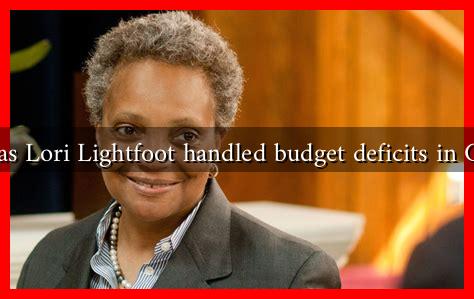-
Table of Contents
How Lori Lightfoot Handled Budget Deficits in Chicago
Since taking office in May 2019, Lori Lightfoot, the first African American woman to serve as the mayor of Chicago, has faced significant challenges, including managing the city’s budget deficits. The financial landscape of Chicago has been complicated by a combination of factors, including the COVID-19 pandemic, pension obligations, and long-standing economic issues. This article explores how Lightfoot has navigated these challenges, the strategies she has employed, and the outcomes of her fiscal policies.
The Financial Landscape of Chicago
Chicago has a history of budget deficits, exacerbated by high pension costs and declining revenues. According to a report from the Civic Federation, the city faced a projected budget deficit of $1.2 billion for 2021. This situation was further complicated by the economic fallout from the COVID-19 pandemic, which led to decreased tax revenues and increased demand for city services.
Strategies Employed by Lori Lightfoot
In response to these challenges, Mayor Lightfoot implemented several strategies aimed at addressing the budget deficits:
- Budget Cuts: Lightfoot proposed significant cuts to various city departments, aiming to streamline operations and reduce expenditures.
. For instance, the 2021 budget included a $1.4 billion spending plan that cut funding for non-essential services.
- Increased Revenue Generation: The mayor sought to increase revenue through various means, including raising taxes on recreational marijuana sales and implementing a new tax on rideshare services. These measures were designed to diversify the city’s revenue streams.
- Federal Aid Utilization: The city leveraged federal aid from the American Rescue Plan, which provided Chicago with approximately $1.9 billion in relief funds. This financial support was crucial in bridging budget gaps and funding essential services.
- Pension Reform: Lightfoot has advocated for pension reform to address the city’s long-term liabilities. While significant changes have yet to be implemented, discussions around restructuring pension payments have been a focal point of her administration.
Case Studies and Examples
One notable example of Lightfoot’s approach to budget management was the 2021 budget process. Faced with a $1.2 billion deficit, the mayor’s administration proposed a budget that included:
- Elimination of nearly 1,000 city jobs.
- Reduction of funding for various city programs, including arts and culture initiatives.
- Increased investment in public safety and mental health services, reflecting a shift in priorities amidst rising crime rates.
Despite the cuts, Lightfoot emphasized the importance of maintaining essential services, particularly in public health and safety. The budget was ultimately passed with a focus on recovery and rebuilding in the wake of the pandemic.
Outcomes and Challenges
While Lightfoot’s strategies have helped to stabilize the budget in the short term, challenges remain. The reliance on federal aid has raised concerns about the sustainability of the city’s financial health once these funds are exhausted. Additionally, the ongoing pension crisis continues to loom over the city’s fiscal future.
According to a report by the Chicago Tribune, the city’s pension funds are only about 60% funded, which poses a significant risk to long-term financial stability. Lightfoot’s administration has acknowledged the need for comprehensive pension reform, but progress has been slow.
Conclusion
Lori Lightfoot’s tenure as mayor of Chicago has been marked by significant fiscal challenges, particularly in managing budget deficits. Through a combination of budget cuts, increased revenue generation, and federal aid utilization, she has made strides in addressing the city’s financial issues. However, the long-term sustainability of these measures remains uncertain, particularly in light of the ongoing pension crisis. As Chicago continues to navigate its financial landscape, the effectiveness of Lightfoot’s strategies will be closely scrutinized by residents and policymakers alike.
For more information on Chicago’s budget and financial strategies, you can visit the Civic Federation.





